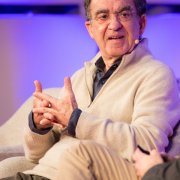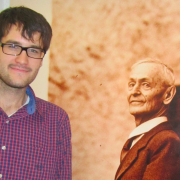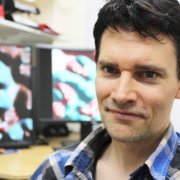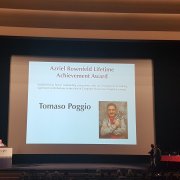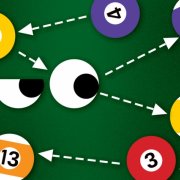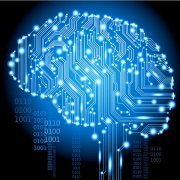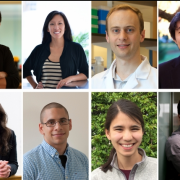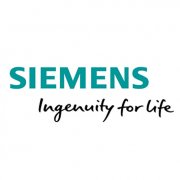November 7, 2017 - 3:00 pm
Autonomous cars and Go-playing computers are impressive, but we’re no closer to machines that can think like people, says neuroscientist Tomaso Poggio.
by Antonio Regalado
Intelligent Machines | MIT Technology Review
Excerpt: "Recent advances that let computers play board games and drive cars haven’t brought the world any closer to true artificial intelligence.
That’s according to Thomas Poggio, a professor at the McGovern Institute for Brain...
November 3, 2017 - 4:00 pm
McGovern Seminar Room (46-3189)
Ryan Cotterell
Title: Probabilistic Typology: Deep Generative Models of Vowel Inventories
Abstract: Linguistic typology studies the range of structures present in human language. The main goal of the field is to discover which sets of possible phenomena are universal, and which are merely frequent. For example,...
Abstract: Linguistic typology studies the range of structures present in human language. The main goal of the field is to discover which sets of possible phenomena are universal, and which are merely frequent. For example,...
October 27, 2017 - 4:00 pm
Niko Kriegeskorte
, Host/Moderator: Josh Tenenbaum
, Panelists (CBMM faculty): Tomaso Poggio, Nancy Kanwisher, James DiCarlo, Josh McDermott, Sam Gershman, ...
Questions that the panel will focus on include:
- What does it mean to "understand" the brain, and especially the ventral stream, in the era of deep networks? Can we come up with better, richer ways of comparing representations in models and brains, which are more revealing of how brains...
- What does it mean to "understand" the brain, and especially the ventral stream, in the era of deep networks? Can we come up with better, richer ways of comparing representations in models and brains, which are more revealing of how brains...
October 24, 2017 - 9:00 am
Prof. Tomaso Poggio was presented with the sixth PAMI Azriel Rosenfeld Lifetime Achievement Award, at the ICCV 2017, in Venice, Italy. This award was established at ICCV 2007 to honor outstanding researchers who are recognized as making significant contributions to the field of Computer Vision over longtime careers. This award is in memory of the late computer scientist and mathematician Prof. Azriel Rosenfeld.
Past Recipients:
Olivier Faugeras...
October 20, 2017 - 4:00 pm
MIT 46-5165 (MIBR Reading Room)
Alison Gopnik, University of California at Berkeley
Abstract: Gopnik will speak for 20-30 minutes about how the study of cognitive development in babies and older children can inform the development of AI systems, and also how ideas from engineering might further our understanding of cognitive development across the lifespan. This short talk will be...
October 18, 2017 - 9:30 am
"Artificial intelligence research has made rapid progress in a wide variety of domains from speech recognition and image classification to genomics and drug discovery. In many cases, these are specialist systems that leverage enormous amounts of human expertise and data.
However, for some problems this human knowledge may be too expensive, too unreliable or simply unavailable. As a result, a long-standing ambition of AI research is to bypass...
October 17, 2017 - 4:00 pm
Before assigning responsibility, our minds simulate alternative outcomes, study shows.
Anne Trafton | MIT News Office
October 17, 2017
“What’s really cool about eye tracking is it lets you see things that you’re not consciously aware of,” Professor Josh Tenenbaum says. “When psychologists and philosophers have proposed the idea of counterfactual simulation, they haven’t necessarily meant that you do this consciously. It’s something going on...
October 13, 2017 - 4:00 pm
Prof. Alan Yuille, John Hopkins University
Abstract: This talk will update progress on a research program which was presented in “Deep Networks and Beyond” at the CBMM AI workshop at Stanford. The goal is to develop hierarchical architectures with the same strong performance abilities as deep networks but which are also able to model the...
October 8, 2017 - 1:30 pm
"Many leading AI researchers think that in a matter of decades, artificial intelligence will be able to do not merely some of our jobs, but all of our jobs, forever transforming life on Earth.
The reason that many dismiss this as science fiction is that we've traditionally thought of intelligence as something mysterious that can only exist in biological organisms, especially humans. But such carbon chauvinism is unscientific.
From my perspective...
October 6, 2017 - 4:00 pm
CBMM PIs
We will introduce the 4 proposed modules for CBMM's renewal. CBMM PIs will present and discuss their research plans and goals at CBMM for the next 5 years. The talks session will be followed by a reception/party (6pm-8pm) to celebrate the renewal by NSF.
Contact for details: Guy Ben-Yosef, gby@mit....
Contact for details: Guy Ben-Yosef, gby@mit....
October 5, 2017 - 4:30 pm
MIT News
By Julie Pryor | McGovern Institute for Brain Research
October 5, 2017
"The High-Risk, High-Reward Research (HRHR) program, supported by the National Institutes of Health (NIH) Common Fund, has awarded 86 grants to scientists with unconventional approaches to major challenges in biomedical and behavioral research. Ten of the awardees are affiliated with MIT and the Broad Institute of MIT and Harvard."
... "Ed Boyden, an associate...
October 5, 2017 - 4:15 pm
Prof. Ed Boyden has received the 2017 NIH Director's Transformative Research Award. This award promotes “cross-cutting, interdisciplinary approaches that could potentially create or challenge existing paradigms.”
Project Title: High-Performance Imaging Through Scattering Living Tissue
Grant ID: R01-DA-045549
Public Health Relevance Statement:
Imaging extended volumes of brain tissue, at rates that keep up with fast events like action potentials...
September 28, 2017 - 7:00 pm
WGBH Studios
Matt Peterson, Postdoc - MIT
Join CBMM's Postdoc Matt Peterson, and others, for BostonTalks Happy Hour: Connected
Connect with WGBH, local leaders, stories, trends and each other at BostonTalks. This September, it’s all about coming together. Hear from three speakers who are doing just that with their careers.
$10 admission -...
Connect with WGBH, local leaders, stories, trends and each other at BostonTalks. This September, it’s all about coming together. Hear from three speakers who are doing just that with their careers.
$10 admission -...
September 22, 2017 - 10:45 am
In September 2014, the Siemens Corporation generously established the CBMM Siemens Graduate Fellowship. This fellowship provides support, for one academic year, to an MIT graduate student whose research bridges two of the main CBMM disciplines (computer science, cognitive science, and neuroscience) and contributes to the CBMM goals of developing a computationally based understanding of human intelligence and establishing an engineering practice...
September 21, 2017 - 6:15 pm
Babies can learn that hard work pays off
Study finds infants try harder after seeing adults struggle to achieve a goal.
Anne Trafton | MIT News Office
September 21, 2017
"If at first you don’t succeed, try, try again.
A new study from MIT reveals that babies as young as 15 months can learn to follow this advice. The researchers found that babies who watched an adult struggle at two different tasks before succeeding tried harder at their own...

